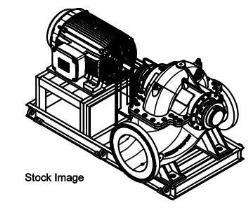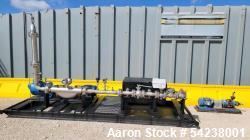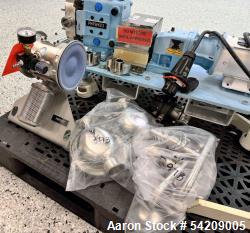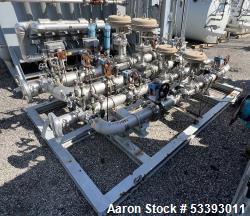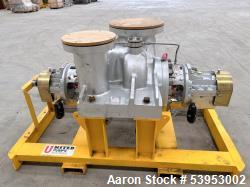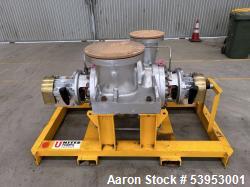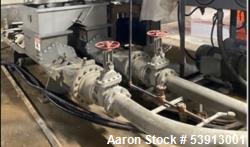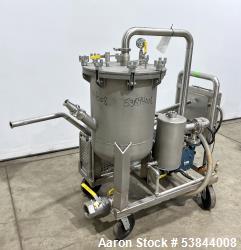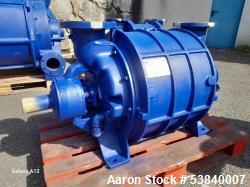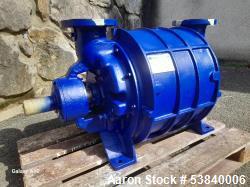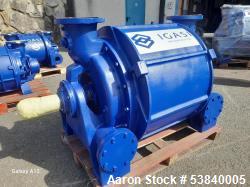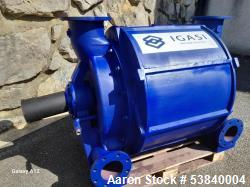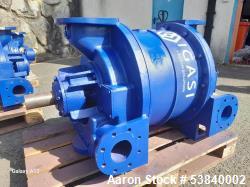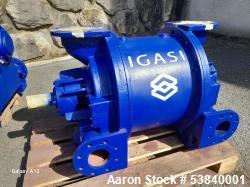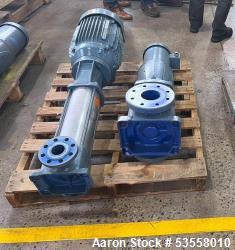Used Pumps
Aaron Equipment has an inventory of reconditioned, unused, and used pumps. Aaron's inventory of pumps include alloy centrifugal, carbon steel centrifugal, diaphram, drum gear, gear pumps, gorator, mazorator, hydraulic pumps, metering pumps, piston high pressure, positive displacement, progressive cavity moyno, stainless centrifugal, sump, and vacuum pumps. Industrial pumps are mechanical devices designed to move fluids, including liquids, gases, and sometimes slurries, from one place to another in industrial settings. These pumps are used in a variety of industries, including manufacturing, chemical processing, oil and gas, water treatment, power generation, and food and beverage production. If you are looking to sell your used industrial pump submit a request online or contact Erik Eichert at 630-238-7480.
Pump It Up: Understanding Which Industrial Pump Is Best For You
Industrial pumps are essential in various industries, from manufacturing to chemical processing and water treatment facilities. Choosing the right pump for your specific needs can significantly enhance operational efficiency and reduce costs. In this article, we'll explain the different types of industrial pumps, including their applications and benefits, to help you make an informed decision.
Types of Industrial Pumps
Industrial pumps come in various shapes and sizes, each designed for specific applications. Here are some of the most common types:
- Positive Displacement Pumps are designed to move a fixed amount of fluid with each cycle. They are ideal for applications requiring precise flow rates and are commonly used in food and beverage, pharmaceuticals, and chemicals.
- Applications and Benefits: Positive displacement pumps handle viscous fluids, slurries, and even solids-laden liquids. They provide a steady, pulse-free flow, crucial for metering and dosing applications.
- Vacuum Pumps remove gas molecules from a sealed volume, creating a partial vacuum. They are essential in industries such as electronics, packaging, and medical equipment manufacturing.
- Applications and Benefits: Vacuum pumps are often used in vacuum forming, degassing, and drying. They help maintain a controlled environment critical for sensitive manufacturing processes.
- Centrifugal Pumps are among the most common types used in industrial settings. They use rotational energy to move fluids and are available in various materials, including stainless steel and carbon.
- Stainless Steel Centrifugal Pumps are known for their durability and resistance to corrosion. They are ideal for handling corrosive fluids and are commonly used in the food and beverage, pharmaceutical, and chemical industries.
- Carbon Centrifugal Pumps are lightweight and cost-effective, making them suitable for less demanding applications where corrosion resistance is not as critical.
- Progressive Cavity and Moyno Pumps, also known as Moyno pumps, are positive displacement pumps that move fluids using a helical rotor. They are especially effective for handling viscous and shear-sensitive materials.
- Applications and Benefits: These pumps are perfect for applications involving sludge, slurry, and other thick materials. They provide a consistent flow rate and can handle materials with a high solids content without clogging.
Factors to Consider When Choosing an Industrial Pump
Choosing the right pump involves considering several factors. Here's what you need to keep in mind:
- Fluid Properties: The type of fluid you need to pump plays a significant role in determining the suitable pump. Consider the fluid's viscosity, temperature, and chemical composition to ensure compatibility with the pump material.
- Flow Rate and Pressure: Determine the required flow rate and pressure for your application. Different pumps have varying capabilities, so matching these parameters with your operational needs is essential.
- Environment and Conditions: Consider the operating environment, including temperature, humidity, and potential exposure to corrosive substances. This will help you choose the right pump material and design to ensure longevity and reliability.
- Maintenance and Cost: Evaluate the maintenance requirements and overall cost of ownership for each pump type. Some pumps may have higher upfront costs but offer lower maintenance expenses over time.
Real-World Examples of Industrial Pump Applications
Industrial pumps are used in a wide range of applications. Here are a few real-world examples:
- Chemical Processing
In chemical processing, positive displacement pumps are often used to handle highly viscous fluids and corrosive chemicals. Their ability to provide a steady flow rate makes them ideal for dosing and mixing applications. - Food and Beverage
In the food and beverage industry, stainless steel centrifugal pumps are commonly used due to their resistance to corrosion and ability to handle sanitary applications. They are often employed in processes like milk pasteurization and beverage production. - Water Treatment
Centrifugal pumps move water through various stages of the treatment process in water treatment facilities. They are essential for ensuring a reliable supply of clean water. - Oil and Gas
Progressive cavity pumps are used in the oil and gas industry to transport crude oil and other viscous materials. Their ability to handle high solids content and maintain a consistent flow rate makes them invaluable in these applications.
Choosing the right industrial pump is crucial for optimizing your operations and ensuring long-term reliability. By understanding the different types of pumps and their applications, you can make an informed decision that aligns with your needs. Whether you require a positive displacement pump for precise dosing or a centrifugal pump for handling large volumes of fluid, the right choice will enhance your efficiency and reduce operational costs.
In summary, consider the properties of the fluid you're working with, the required flow rate and pressure, the environmental conditions, and the maintenance needs when selecting an industrial pump. With this knowledge, you'll be well-equipped to choose the best pump for your application, ensuring smooth and efficient operations.
